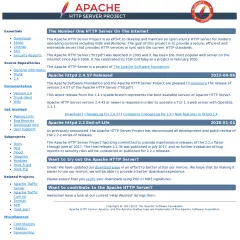Apache HTTP Server 
Apache HTTP Server is used by 3.12% of sites
Official Website
https://httpd.apache.org/Category
Web Servers
The Apache HTTP Server, commonly known as Apache, is a free and open-source web server software that powers a significant portion of websites on the internet. It is developed and maintained by the Apache Software Foundation. Apache is known for its stability, scalability, and extensive feature set, making it one of the most popular choices for hosting web applications and serving web content.
Here are some key features and aspects of the Apache web server:
HTTP Protocol Support: Apache supports the Hypertext Transfer Protocol (HTTP) and its secure variant, HTTPS. It allows users to serve web content and handle HTTP requests from clients, such as web browsers. Apache can handle static files, dynamic content generated by scripting languages like PHP, Python, and Ruby, as well as server-side technologies like CGI and FastCGI.
Cross-Platform Compatibility: Apache is cross-platform and can run on various operating systems, including Unix-based systems (such as Linux and macOS) and Windows. This makes it a versatile choice for developers and system administrators working on different platforms.
Modular Architecture: Apache has a modular architecture that allows users to extend its functionality by adding or enabling various modules. Modules can be used to enhance security, enable additional protocols, implement caching, support different scripting languages, and more. Apache's modular design allows users to customize and optimize the server based on their specific needs.
Virtual Hosting: Apache supports virtual hosting, allowing multiple websites to be hosted on a single server. With virtual hosting, different domain names can be associated with specific directories or configurations, enabling hosting providers or individuals to efficiently manage multiple websites on a single Apache server.
Security Features: Apache includes various security features to protect web applications and server resources. It supports Secure Sockets Layer (SSL) and Transport Layer Security (TLS) protocols for encrypted communication, ensuring secure data transmission. Apache also provides access control mechanisms, authentication methods, and configurable security policies to safeguard against unauthorized access and potential attacks.
Performance and Scalability: Apache is known for its performance and scalability. It can handle a large number of concurrent connections and efficiently serve static and dynamic content. Apache's ability to use multiple processes or threads, along with features like load balancing and caching, contributes to its scalability and performance optimization.
Logging and Monitoring: Apache offers extensive logging capabilities, allowing administrators to track and analyze web server activity. It provides access logs, error logs, and customizable log formats, enabling the monitoring and troubleshooting of server and website issues. Apache can integrate with various monitoring tools and software for real-time performance monitoring and analysis.
Community and Support: Apache benefits from a large and active community of developers and users who contribute to its development, provide support, and share knowledge. The Apache Software Foundation maintains comprehensive documentation, forums, mailing lists, and other resources to assist users and foster collaboration.
Apache's widespread adoption, robustness, and feature-rich nature have made it a popular choice for web hosting, serving websites, and powering web applications. It is a reliable and versatile web server software that continues to play a significant role in the internet infrastructure.
Here are some key features and aspects of the Apache web server:
HTTP Protocol Support: Apache supports the Hypertext Transfer Protocol (HTTP) and its secure variant, HTTPS. It allows users to serve web content and handle HTTP requests from clients, such as web browsers. Apache can handle static files, dynamic content generated by scripting languages like PHP, Python, and Ruby, as well as server-side technologies like CGI and FastCGI.
Cross-Platform Compatibility: Apache is cross-platform and can run on various operating systems, including Unix-based systems (such as Linux and macOS) and Windows. This makes it a versatile choice for developers and system administrators working on different platforms.
Modular Architecture: Apache has a modular architecture that allows users to extend its functionality by adding or enabling various modules. Modules can be used to enhance security, enable additional protocols, implement caching, support different scripting languages, and more. Apache's modular design allows users to customize and optimize the server based on their specific needs.
Virtual Hosting: Apache supports virtual hosting, allowing multiple websites to be hosted on a single server. With virtual hosting, different domain names can be associated with specific directories or configurations, enabling hosting providers or individuals to efficiently manage multiple websites on a single Apache server.
Security Features: Apache includes various security features to protect web applications and server resources. It supports Secure Sockets Layer (SSL) and Transport Layer Security (TLS) protocols for encrypted communication, ensuring secure data transmission. Apache also provides access control mechanisms, authentication methods, and configurable security policies to safeguard against unauthorized access and potential attacks.
Performance and Scalability: Apache is known for its performance and scalability. It can handle a large number of concurrent connections and efficiently serve static and dynamic content. Apache's ability to use multiple processes or threads, along with features like load balancing and caching, contributes to its scalability and performance optimization.
Logging and Monitoring: Apache offers extensive logging capabilities, allowing administrators to track and analyze web server activity. It provides access logs, error logs, and customizable log formats, enabling the monitoring and troubleshooting of server and website issues. Apache can integrate with various monitoring tools and software for real-time performance monitoring and analysis.
Community and Support: Apache benefits from a large and active community of developers and users who contribute to its development, provide support, and share knowledge. The Apache Software Foundation maintains comprehensive documentation, forums, mailing lists, and other resources to assist users and foster collaboration.
Apache's widespread adoption, robustness, and feature-rich nature have made it a popular choice for web hosting, serving websites, and powering web applications. It is a reliable and versatile web server software that continues to play a significant role in the internet infrastructure.